Lam Thuy Vo / BuzzFeed News Left: A new apartment building in Brooklyn. Right: A sign at an establishment nearby that NYPD had ...
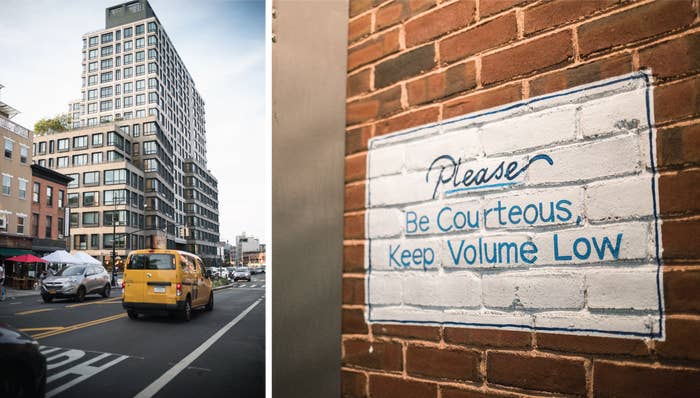
Lam Thuy Vo / BuzzFeed News
Left: A new apartment building in Brooklyn. Right: A sign at an establishment nearby that NYPD had identified as a MARCH target.
It was a busy Friday night in the spring of 2018 at Friends and Lovers, a Crown Heights bar in Brooklyn that caters to a clientele that is largely Black, people of color, and LGBTQ, and the back patio was packed with people dancing when the police stormed in. The lights came on and the music stopped. And then, as cops circulated through the bar, officials from five different city and state of New York agencies followed along, issuing fines one by one.
First, the Department of Buildings cited Diana Mora, the bar’s owner, for exceeding the maximum occupancy. Then Fire Department inspectors noticed candles in open glasses. That was another $75 fine. The State Liquor Authority found that the bar’s license had been laminated, which Mora had done to protect it but is against regulations. Mora would have to buy a new one for $300.
Altogether, Friends and Lovers racked up $2,500 worth of fines that night in March 2018. The bar had to shut down for weeks afterward to get into compliance — including building a new wall that cost about $50,000 in construction and other fees. It touched off a series of visits from the FDNY, and countless bureaucratic hassles and fines. The bar was also visited by several police officers a second time in October and listed as a potential target for a third raid, Mora said.
Ultimately, Mora said, the raids and their aftermath ruined her once-prosperous business and left her operating month to month, trying to meet expenses.

Lam Thuy Vo / BuzzFeed News
Diana Mora in front of her bar, Friends and Lovers, in Brooklyn.
The raids of Friends and Lovers and other local businesses were part of a project led by the NYPD known as MARCH, or multiagency response to community hot spots. NYPD documents state these raids are “designed to direct enforcement efforts at specific establishments which have become a source of complaints from the community and have a negative impact on quality of life conditions in the surrounding neighborhood.” Yet those “quality of life conditions” often stem from nonviolent neighborly disputes in gentrifying communities, such as noise or theft, according to advocates and local politicians.
While Mora, who was born and raised in New York City and is Latina, is not certain why her bar was targeted, she suspects that she was reported by surrounding neighbors for noise complaints and nearby wallet thefts. During one of the raids, a police officer told her the bar was “popular” when she asked why it was targeted. But she said she knows of no serious crimes that happened in or around her bar. Indeed, according to NYPD crime statistics, the number of felony crimes dropped by close to 60% between 2000 and 2019 in the 77th Precinct, where Friends and Lovers is located. Yet in that same time, the neighborhood changed in other ways, too: Mostly, it became more expensive and whiter.
But it’s not just prices that go up when gentrification happens — it often means that neighborhood disputes are more likely to result in police action. A 2018 BuzzFeed News analysis of 311 noise complaints showed how it led to the over-policing of people of color in gentrifying New York neighborhoods.
New residents are also less likely to know who to talk to in the community to address potential conflicts. Saheed Vassell, 34, was shot dead by four officers in Crown Heights, Brooklyn, for holding a metal pipe in his hands and pointing it at people. Officers were responding to multiple 911 calls, but a neighbor told the Brooklyn Daily Eagle that Vassell had been known in the area for 20 years and was “quirky” and had mental health issues — but that long-term residents knew he was harmless. In California, security guard Alex Nieto was shot to death by police in the gentrifying San Francisco neighborhood he grew up in while eating a burrito on a park bench after a new neighbor, alarmed by the Taser he carried for his job as a bouncer at a nightclub, called the police. And the police raid during which Breonna Taylor was killed in her own home was connected to efforts to evict longtime residents for a new real estate project, her family’s lawyers allege.
Yet these trends don’t just affect individuals — they can ruin long-standing local businesses. The raid on Friends and Lovers shows what can happen to the establishments that cater to long-term residents when neighborhoods gentrify and differences between new residents and old — such as noise complaints — are reported to the police.
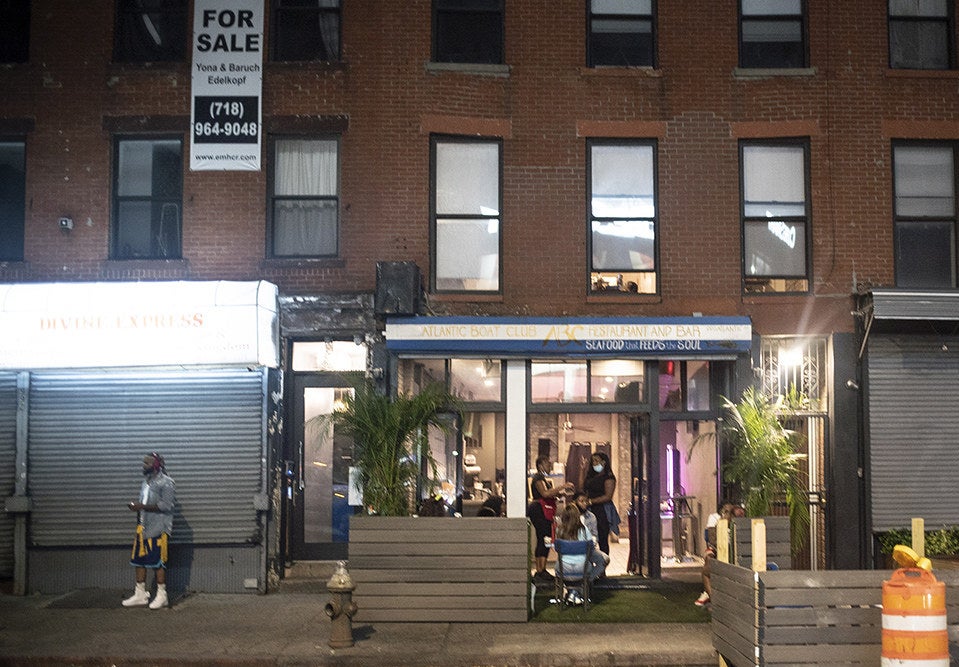
Lam Thuy Vo / BuzzFeed News
The Atlantic Boat Club in Crown Heights
The NYPD has not responded to a request for comment from BuzzFeed News.
“It’s the responsibility of the location to keep things safe and to operate within code,” Jim Long, a spokesperson for the FDNY, told BuzzFeed News. “Sometimes our inspections permit an opportunity to correct issues without a fine and there are other times when they will warrant a violation that could lead to a summons if not handled in an expedited fashion.”
The Crown Heights neighborhood where Friends and Lovers is located is ground zero for this kind of friction. Between 2000 and 2017, the median home value there rose by 167% from $203,611.35 to $544,800 and the median income went from $40,796.67 to $70,125 (values are adjusted for inflation and in 2017 dollars). According to Zillow, a one-bedroom apartment in a nearby development that was built in 2017 was listed for $3,600 in rent. Another one-bedroom sold for $1.5 million.
But developers and real estate agents often use businesses like Friends and Lovers in their promotional material to draw in new residents — because they offer exactly the image of urban cool that makes a place hip and desirable. The Corcoran Group, a real estate firm that lists apartments for sale and rent in the neighborhood, describes it in its marketing materials as a place where “Gentrifying trends haven’t been as pronounced [...] but some new bars and bistros are drawing visitors to Crown Heights.”
The company did not respond to requests for comment but removed the mention of gentrification on its website after being contacted by BuzzFeed News. The original text can still be viewed in the cached Google results for their website.
Big developers and realty groups have approached Mora five separate times to have Friends and Lovers featured in their real estate materials for a new luxury building. It’d be good for business, they told her.
But that didn’t sound right to Mora, who worried that gentrification would only bring with it more problems to her business.
The majority of businesses in the neighborhood around Friends and Lovers that were targeted by police for MARCH raids were Black-owned, and many have since closed down. A BuzzFeed News analysis of potential MARCH targets identified 14 businesses, at least eight of which were Black-owned, according to interviews with the owners or long-term neighbors. At least five had closed permanently since they were targeted, though it’s unclear how much the raids or pandemic-related shutdowns contributed to their demise.
“People move into these neighborhoods because of the communities we’ve pioneered,” Mora told BuzzFeed News. “The same people who move into the neighborhood and pay high rents for their new apartments are probably going to call the police about noise complaints.”
Number of times a location was listed as a "community hot spot" by NYPD
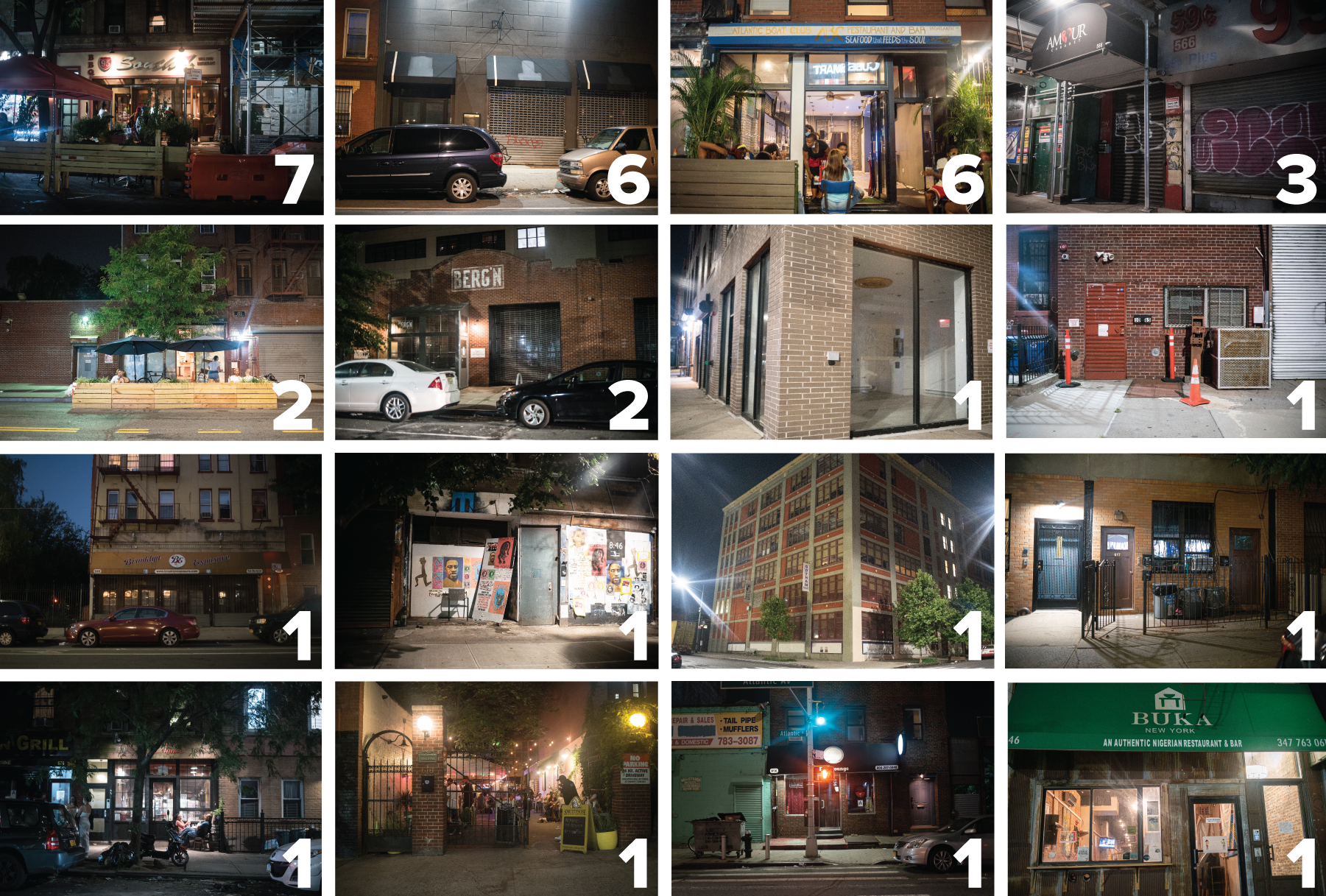
Lam Thuy Vo / BuzzFeed News
From left to right and top to bottom: 95 South Soul Food (restaurant), Milk River (restaurant), B-Hive (bar, now closed and turned into a restaurant by a new owner), Amour Cabaret (strip club), Doris (bar), Berg'n (beer hall), unknown, Pacific BK (event space), Brooklyn Exposure (restaurant), Lox (bar, now closed), unknown, unknown, Vincente's (bar, now closed and turned into a restaurant by a new owner), Franklin Park (bar), Kinanm Lounge (bar), Buka (restaurant)
Source: NYC Artist Coalition, Yelp, Google Street View, BuzzFeed News reporting
The businesses identified by BuzzFeed News were a mix of restaurants, bars with DJ setups, a strip club, and other public venues. BuzzFeed News traveled to each location listed to speak to owners to determine which were actually raided and why. In the case of businesses that had closed, BuzzFeed News made multiple efforts to reach out to former owners.
Many of the businesses targeted didn’t even know they were on the NYPD list of MARCH targets. Four business owners told BuzzFeed News that inspectors or police officers had often visited their establishments but that they didn’t know why.
Even when a business changes hands, it can still face the repercussions of having once been labeled a crime hot spot. In April 2018, Shanylka Hunt-Mitchell, 37, took over a bar called the B-Hive that had a violent past — including two shootings — and was listed as a target six times by NYPD. She said she had invested more than $300,000 in remodeling the place into a seafood restaurant called the Atlantic Boat Club. But despite this makeover, she said, the police were still coming to harass her.
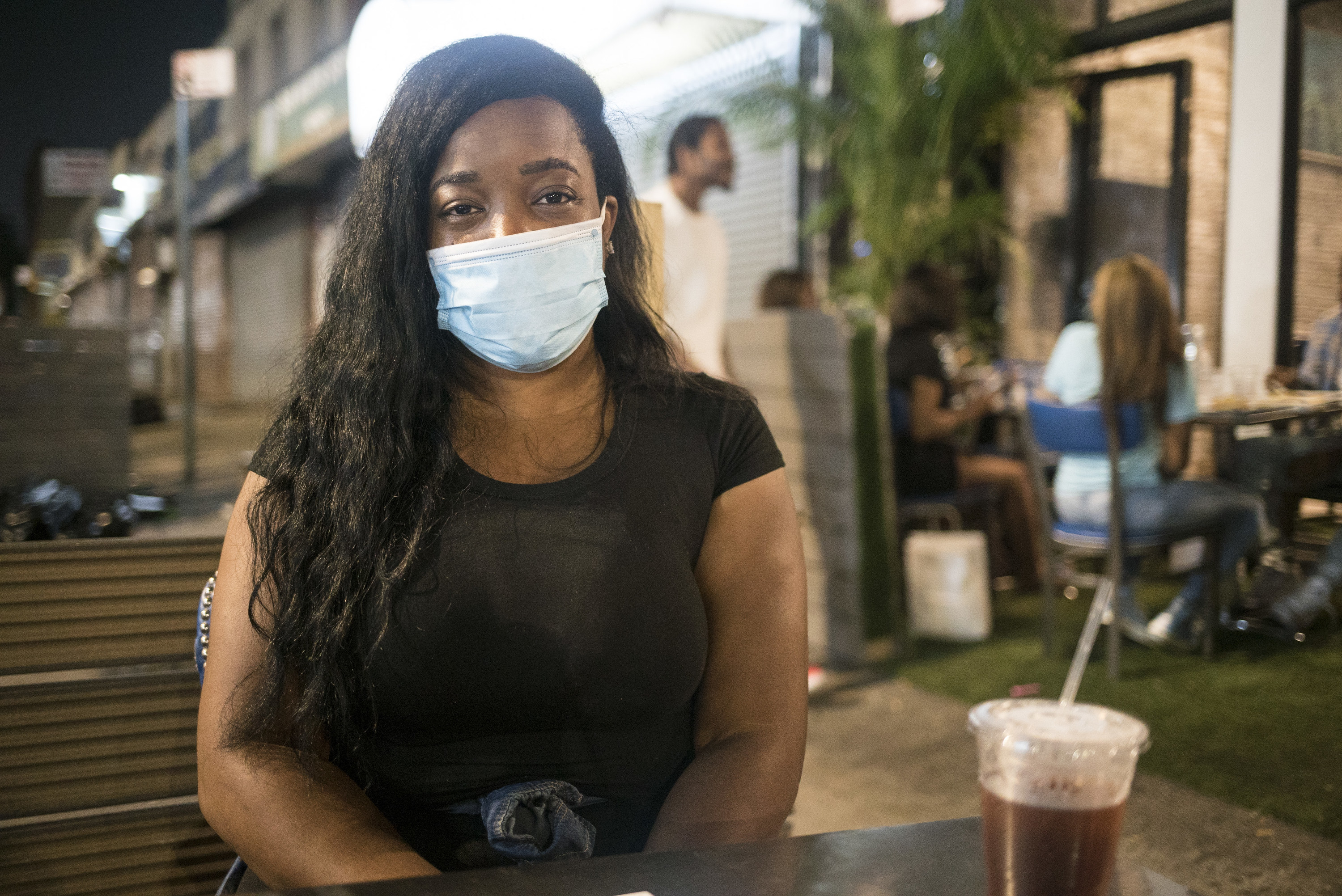
Lam Thuy Vo / BuzzFeed News
Shanylka Hunt-Mitchell sits in front of her restaurant, the Atlantic Boat Club.
Hunt-Mitchell’s trust in the NYPD has been steadily declining ever since she opened her restaurant. One day a customer turned violent, so she called the police, but she said the dispatcher told her they would not be able to send anyone over to keep her safe. That man shot someone in the neighborhood shortly afterward. Only then did police come but rather than address that incident, she said they referred her business to the State Liquor Authority, which initially fined her $25,000 and temporarily suspended her license. (She was able to fight the charges and reinstate her liquor license with the help of a lawyer, who helped her reduce the fees by 80%.)
And even after she paid the reduced fines, she said police continued to come to her business. Most recently, police officers visited the restaurant unannounced. Officers accused her of violating social distancing regulations and of serving someone a drink during a time when only takeout orders were allowed, though Hunt-Mitchell’s lawyer disputes these violations. She lost her liquor license once more and is now facing a fine of at least $50,000.
“I don't want to be afraid to call the police because I'm afraid to lose my business [...] They fine you, and fine you, until you’re gone,” said Hunt-Mitchell. “I feel like I’m paying for what happened at B-Hive.”
The NYPD did not respond to multiple requests for comment on the raids at Friends and Lovers or the other bars identified by BuzzFeed News. However, in a public forum, NYPD Deputy Chief Frank Vega said there are various factors that play into how MARCH targets are selected that include but aren’t exclusive to 311 and 911 calls. He said raiding “is not our first course of business. It’s to talk to the owners, to talk to the bartenders.” He added that officers don’t “get extra credit for doing MARCH operations.” But none of the business owners who experienced a MARCH raid and who spoke to BuzzFeed News said they were warned in advance by the NYPD.
Local groups are doing their best to shed light on the damage these raids do to businesses. The NYC Artist Coalition, a volunteer-driven collective, helped put together a political campaign called “Talks Not Raids,” and pushed forward a bill in New York City that passed last December, to bring transparency to how the raids are conducted. The city’s office for nightlife meanwhile has begun a mediation program to help resolve conflicts between neighbors and businesses. The first report is due this September, though COVID-related closures may skew any findings.
For local political activists, like former City Council member Rafael Espinal, this legislation is just the first step toward fixing an issue that largely affects businesses patronized by “people of color and LGBTQ” clientele. “I think it’s part of a bigger multipronged approach [to tackle MARCH operations].”
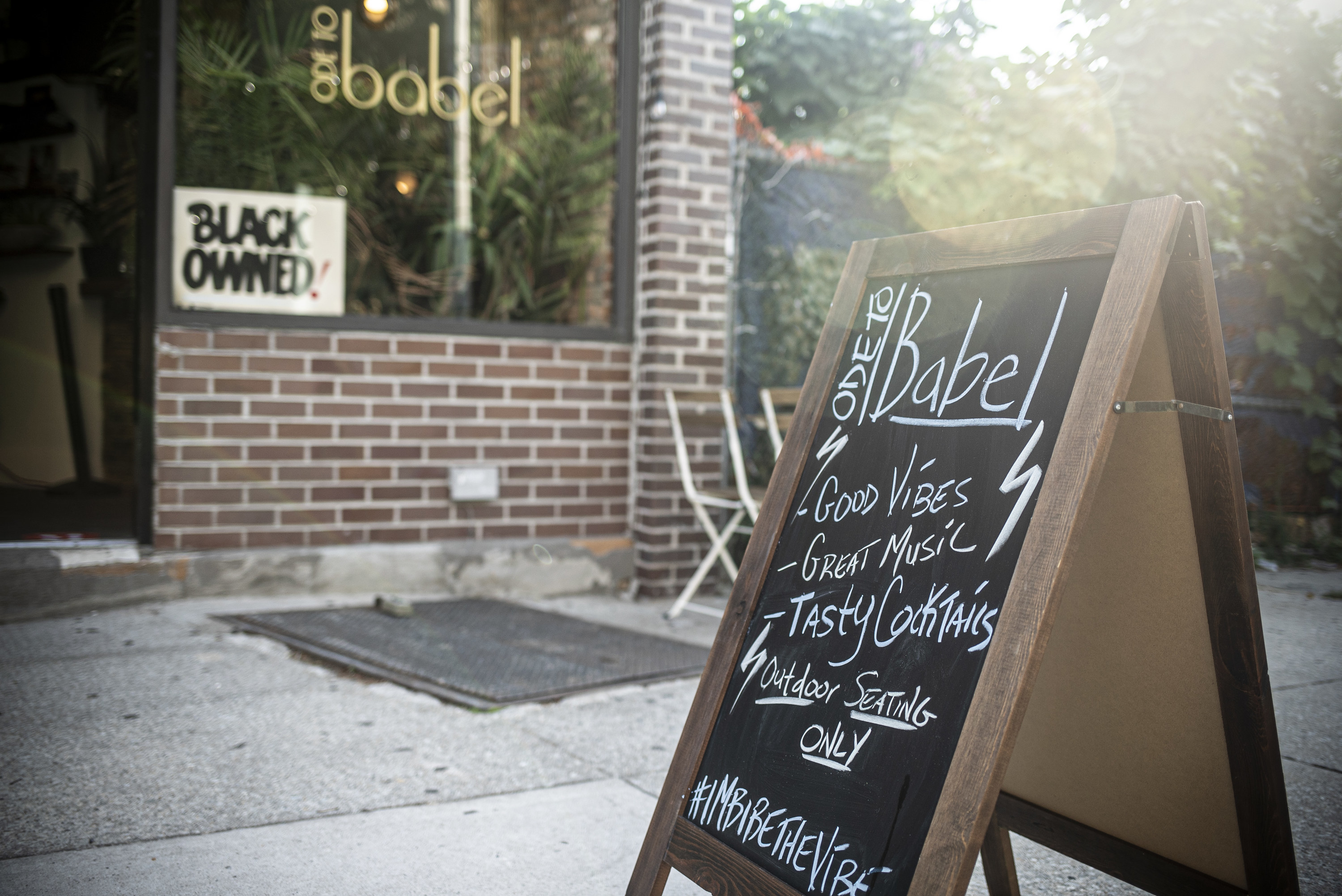
Lam Thuy Vo / BuzzFeed News
Ode to Babel on a recent Saturday
Marva Babel-Tucker and her twin sister, Myriam Burke, opened Ode to Babel, a bar and community space in Crown Heights, five years ago. An interior designer who worked in various corporate settings, Babel-Tucker wanted to create “a space that amplified and elevated entrepreneurship of people in the community,” she told BuzzFeed News. Ode to Babel hosts DJ nights, poetry readings from local writers, and pop-up shops with handcrafted products aimed to celebrate Black residents, many of whom don’t feel catered to by other local businesses.
“Being where we are and staying steady is the way we’re pushing back about losing our spaces,” said Babel-Tucker who was born and raised in Bed Stuy, Brooklyn, and has lived in Prospect Heights for 20 years. Between 2000 and 2017, the white population grew by 27 percentage points in the area where Ode to Babel is located while the Black population shrunk by around the same amount.
“It hurts me to see the drastic changes in my community. It hurts. It’s erasure,” she told BuzzFeed News. “Having a space like ours, [it’s like] putting down your flag.”
In the five years since it opened, she said the number of noise complaints has increased in tandem with more luxury buildings and apartments going on the market nearby. “If you paid $1.5 million for a one-bedroom apartment, then you are going to have entitlement,” said Babel-Tucker.
In October 2018, Ode to Babel also became a target for a MARCH raid. On a busy Friday night, 20 agents showed up and demanded the DJ stop the music. Agents from each department ticketed her for code violations like a missing tag on a fire extinguisher, and a broken faucet in the basement. All in all the fines stacked up to approximately $10,000 that night though they were able to dismiss them later, she said. The bar also almost lost its liquor license as a consequence.
After the raid, Babel-Tucker said she began reaching out more to her neighbors to find out how she can address any issues they have. But even then, a white neighbor launched a protest on Nextdoor against the renewal of the bar’s liquor license, Grub Street reported. Babel-Tucker successfully responded by rounding up more than 180 letters of support from Black neighbors.
Yet Babel-Tucker told BuzzFeed News that none of her neighbors had approached her directly about the noise levels. One white neighbor, with whom she was friendly, even showed up at a community board meeting to call for it to be shut down without ever raising the issue with her personally.
For Crystal Hudson, a Brooklyn resident whose family has lived in Prospect Heights for three generations, what happened at Ode to Babel was symbolic of a rift in demographically changing neighborhoods.
“As a Black queer person, [Ode to Babel] is a safe place. I never thought we had a safe space and it has such a strong sense of community,” said Hudson. “To know that there are white neighbors who can feel like they can run this place out of business, I take that very personally.”
Hudson started the Greater Prospect Heights Mutual Aid group at the beginning of the pandemic to assist elderly people in the neighborhood and organized weekly calls with neighbors to discuss the needs of residents. On the calls, experts would talk about specific issues like homelessness in the neighborhood. A psychotherapist came on to discuss mental health. An organization that centers on Black health discussed the disproportionate impact that COVID-19 has had on Black and Latinx populations.
Just like with Atlantic Boat Club, Babel-Tucker continued to face scrutiny. When she tried to open a second bar, she had to fight tooth and nail to get her liquor license due to the MARCH raid.
“When we say Black Lives Matter, we are talking about our livelihoods as well,” she said.